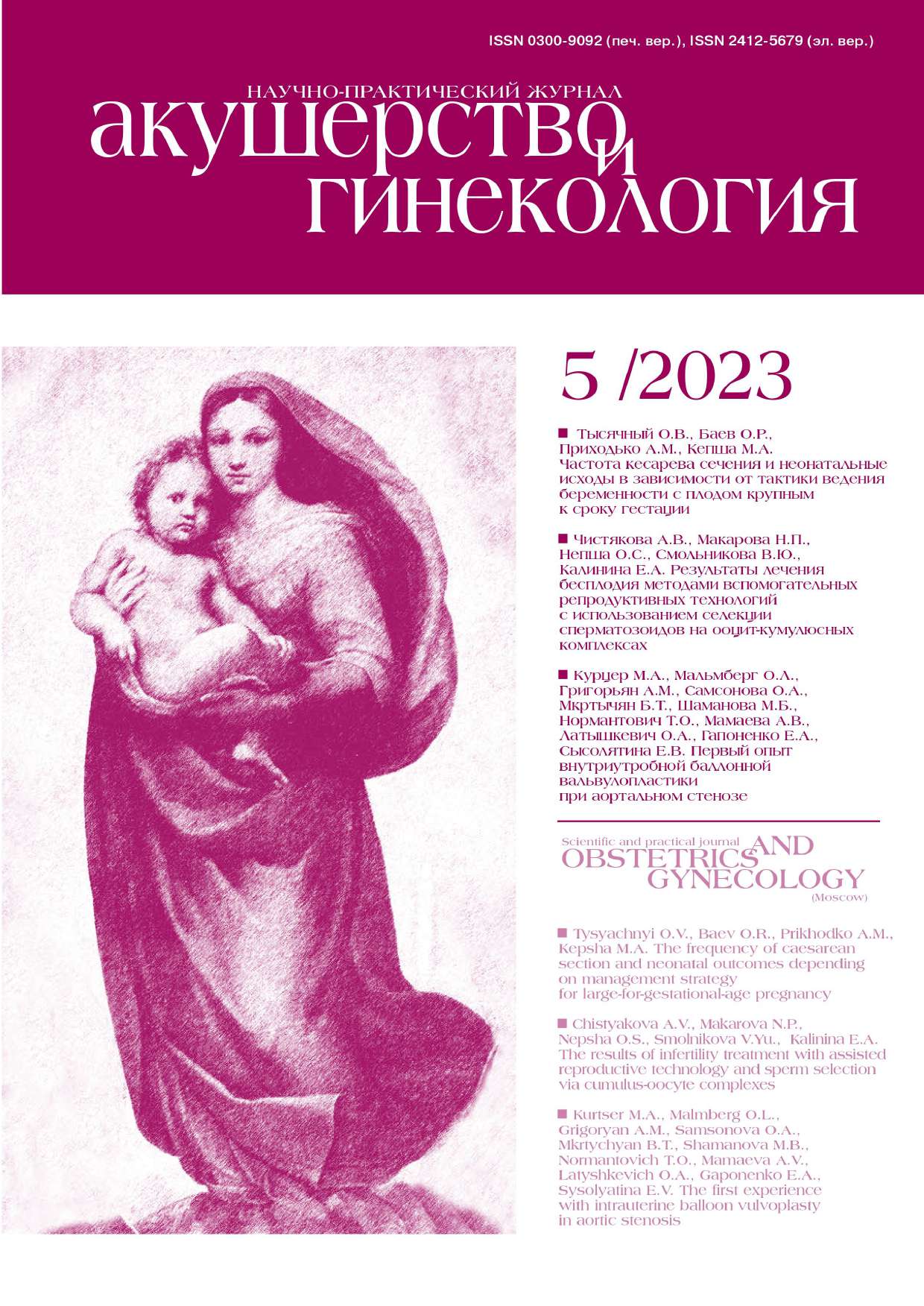Experience with bovhyaluronidase azoximer used in the combination treatment of chronic endometritis in women with repeated implantation failures
- 作者: Lokshin V.N.1, Askar Y.1,2, Rybina A.N.1,2, Abshekenova A.T.1,2, Karibayeva S.K.1,2, Valiev R.K.1
-
隶属关系:
- “PERSONA” International Clinical Center of Reproductology
- Asfendiyarov Kazakh National Medical University
- 期: 编号 5 (2023)
- 页面: 108-112
- 栏目: Exchange of Experience
- URL: https://journals.eco-vector.com/0300-9092/article/view/516581
- DOI: https://doi.org/10.18565/aig.2023.119
- ID: 516581
如何引用文章
详细
Objective: To evaluate the efficiency of using bovhyaluronidase azoximer in the combination treatment of chronic endometritis in women with repeated implantation failures (RIFs).
Materials and methods: Examinations were made in 84 women with chronic endometritis and RIFs who had been treated using in vitro fertilization/intracytoplasmic sperm injection (IVF/ICSI) in the “PERSONA” International Clinical Center of Reproductology (Almaty, Kazakhstan) in January 2020 to January 2022 and followed up within 9 months after treatment. Two groups were identified by the treatment method: a study group that received antibacterial therapy in combination with bivhyaluronidase azoximer; a control group used antibacterial therapy alone.
Results: After treatment, a negative result to the expression of CD138+ cells was considerably frequent in the study group than in the control group (0.88±1.27 versus 6.48±7.40; p=0.00014). The pregnancy rate in the first cycle after transfer of a single frozen-thawed embryo was statistically higher in the study group than in the control group (78% versus 41.1%; р<0.001). Accordingly, the live birth rate was also higher in the study group than in the control group (62% versus 32.3%; р=0.008).
Conclusion: Chronic endometritis frequently occurs in women with RIFs. The results of the conducted study showed the high efficiency of using bovhyaluronidase azoximer in combination with antibacterial therapy, a substantial reduction in the expression of CD138+ cells, and increases in the rate of pregnancy, and the live birth rates in this category of women.
全文:
作者简介
Vyacheslav Lokshin
“PERSONA” International Clinical Center of Reproductology
Email: v_lokshin@persona-ivf.kz
ORCID iD: 0000-0002-4792-5380
Academician of the National Academy of Sciences of the Republic of Kazakhstan, Professor, Chief Reproductive Specialist of the Ministry of Reproductive Medicine, President of the Kazakhstan Association of Reproductive Medicine, General Director of the “PERSONA” International Clinical Center of Reproductology
哈萨克斯坦, AlmatyYenglik Askar
“PERSONA” International Clinical Center of Reproductology; Asfendiyarov Kazakh National Medical University
编辑信件的主要联系方式.
Email: yenglik.askar@yahoo.com
ORCID iD: 0000-0002-2538-3728
Obstetrician-Gynecologist, “PERSONA” International Clinical Center of Reproductology; Doctoral Student, Asfendiyarov Kazakh National Medical University
哈萨克斯坦, Almaty; AlmatyAnastasia Rybina
“PERSONA” International Clinical Center of Reproductology; Asfendiyarov Kazakh National Medical University
Email: oedema@mail.ru
ORCID iD: 0000-0002-9368-6683
Reproductive Specialist, Obstetrician-Gynecologist, “PERSONA” International Clinical Center of Reproductology, Doctoral Student, Asfendiyarov Kazakh National Medical University
哈萨克斯坦, Almaty; AlmatyAigerim Abshekenova
“PERSONA” International Clinical Center of Reproductology; Asfendiyarov Kazakh National Medical University
Email: abshekenova@gmail.com
ORCID iD: 0000-0002-3138-6650
Reproductive Specialist, Obstetrician-Gynecologist, “PERSONA” International Clinical Center of Reproductology; Doctoral Student, Asfendiyarov Kazakh National Medical University
哈萨克斯坦, Almaty; AlmatySholpan Karibayeva
“PERSONA” International Clinical Center of Reproductology; Asfendiyarov Kazakh National Medical University
Email: sh.karibaeva@gmail.com
ORCID iD: 0000-0001-5691-8652
PhD, Associate Professor of the Department of Obstetrics and Gynecology, Asfendiyarov Kazakh National Medical University; Reproductologist, Obstetrician-Gynecologist, Director of Strategic Development, “PERSONA” International Clinical Center of Reproductology
哈萨克斯坦, Almaty; AlmatyRavil Valiev
“PERSONA” International Clinical Center of Reproductology
Email: rvaliev75@mail.ru
ORCID iD: 0000-0003-2526-4291
PhD, Reproductive Specialist, Obstetrician-Gynecologist
哈萨克斯坦, Almaty参考
- Bayer-Garner I.B., Nickell J.A., Korourian S. Routine syndecan-1 immunohistochemistry aids inthe diagnosis of chronic endometritis. Arch. Pathol. Lab. Med. 2004; 128(9): 1000-3. https://dx.doi.org/10.5858/ 2004-128-1000-RSIAIT.
- Bouet P.E., El Hachem H.,Monceau E.,Gariépy G.,Kadoch I.J., Sylvestre C. Chronic endometritis in women with recurrent pregnancy loss and recurrent implantation failure: prevalence and role of office hysteroscopy and immunohistochemistry in diagnosis. Fertil. Steril. 2016; 105(1): 106-10. https://dx.doi.org/10.1016/j.fertnstert.2015.09.025.
- Li Y., Xu S., Yu S., Huang C., Lin S., Chen W. et al. Diagnosis of chronic endometritis: How many CD138+ cells/HPF in endometrial stroma affect pregnancy outcome of infertile women? Am. J. Reprod. Immunol. 2021; 85(5): e13369. https://dx.doi.org/10.1111/aji.13369.
- Chen Y.Q., Fang R.L., Luo Y.N., Luo C.Q. Analysis of the diagnostic value of CD138 for chronic endometritis, the risk factors for the pathogenesis of chronic endometritis and the effect of chronic endometritis on pregnancy: a cohort study. BMC Womens Health. 2016; 16(1): 60. https://dx.doi.org/10.1186/s12905-016-0341-3.
- McQueen D.B., Bernardi L.A., Stephenson M.D. Chronic endometritis in women with recurrent early pregnancy loss and/or fetal demise. Fertil. Steril. 2014; 101(4): 1026-30. https://dx.doi.org/10.1016/j.fertnstert.2013.12.031.
- Cicinelli E., Matteo M., Tinelli R., Pinto V., Marinaccio M., Indraccolo U. et al. Chronic endometritis due to common bacteria is prevalent in women with recurrent miscarriage as confirmed by improved pregnancy outcome after antibiotic treatment. Reprod. Sci. 2014; 21(5): 640-7. https://dx.doi.org/10.1177/1933719113508817.
- Cicinelli E., Vitagliano A., Kumar A., Lasmar R.B., Bettocchi S., Haimovich S.; International Working Group for Standardization of Chronic Endometritis Diagnosis. Unified diagnostic criteria for chronic endometritis at fluid hysteroscopy: proposal and reliability Evaluation through an international randomized-controlled observer study. Fertil. Steril. 2019; 112(1): 162-173.e2. https://dx.doi.org/10.1016/j.fertnstert.2019.03.004.
- Park H.J., Kim Y.S., Yoon T.K., Lee W.S. Chronic endometritis and infertility. Clin. Exp. Reprod. Med. 2016; 43(4): 185-92. https://dx.doi.org/10.5653/cerm.2016.43.4.185.
- Cicinelli E., Resta L., Nicoletti R., Zappimbulso V., Tartagni M., Saliani N. Endometrial micropolyps at fluid hysteroscopy suggest the existence of chronic endometritis. Hum. Reprod. 2005; 20(5): 1386-9. https://dx.doi.org/10.1093/humrep/deh779.
- Gardner D.K., Lane M., Stevens J., Schlenker T., Schoolcraft W.B. Blastocyst score affects implantation and pregnancy outcome: towards a single blastocyst transfer. Fertil. Steril. 2000; 73(6): 1155-8. https://dx.doi.org/10.1016/ s0015-0282(00)00518-5.
- Pacchiarotti A., Selman H., Valeri C., Napoletano S., Sbracia M., Antonin G. et al. Ovarian stimulation protocol in IVF: An Up-to-Date Review of the Literature. Curr. Pharm. Biotechnol. 2016; 17(4): 303-15. https://dx.doi.org/10.2174/ 1389201017666160118103147.
补充文件







